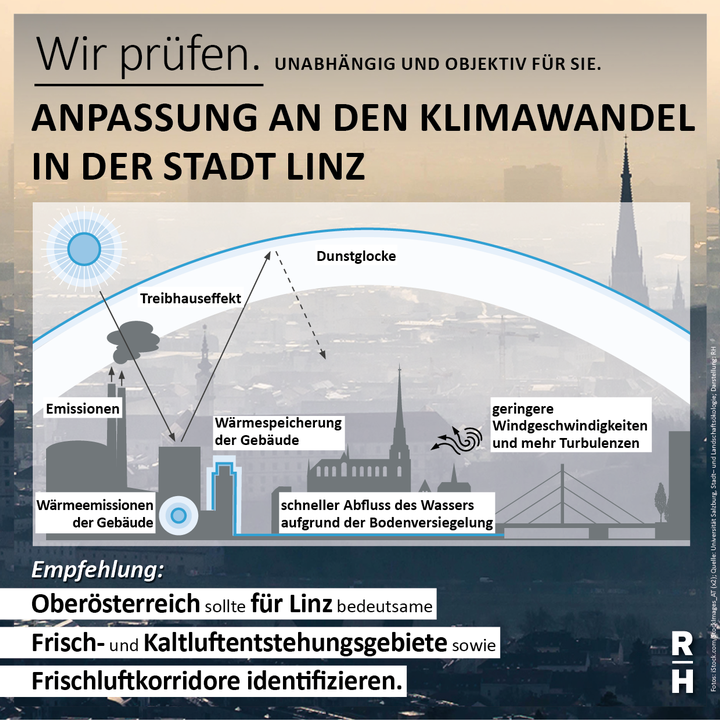Adapting to climate change

Cities are particularly affected by climate change. During hot summers, the densely built-up and sealed areas absorb more heat than the surroundings and store this heat. The development of “urban heat islands” has an adverse effect on the wellbeing and the health of the cities’ inhabitants: buildings and sealed areas – roads and parking spaces – generate higher apparent temperatures than the surroundings, which impairs sleep during the night. Such effects can cause health burdens that can become potentially life-threatening. The city of Linz is also affected. Today the Austrian Court of Audit (ACA) published its report on "Climate Change Adaptation in the City of Linz", wherein it states the following: cities need adaptation measures to climate change in order to maintain and/or improve the citizens’ quality of life.
The audited period spanned the years from 2015 through 2019.
Linz falls behind Vienna and Graz
In order to improve the urban climate and consequently also the quality of life, the cities of Vienna and Graz developed strategic plans to adapt to climate change already years ago. Vienna established an “Urban Heat Islands Strategic Plan” already in 2015 in order to cool down urban heat islands. In Graz, the municipal council adopted a climate change adaptation strategy in 2016. The city prepared an action plan with adaptation measures in 2018.
The ACA critically points to the fact that the city of Linz – with about 208,000 inhabitants – was comparatively late in developing an action programme to adapt to climate change: in December 2018, the city of Linz commissioned a company with the preparation of a baseline study. Based on that, the Linz City Council adopted a climate package in November 2019, which contains a declaration of principles and an overview of actions for the Linz climate strategy.
The auditors critically state that the action programme of the city of Linz represents an overview of measures, but not yet a concept for adaptation to climate change. Furthermore, some of the measures are very general and the effects of their implementation are not measurable.
The ACA therefore recommends to the city of Linz to timely prepare and adopt a concept for adaptation to climate change. To this end, the measures outlined in the overview would have to be specified more precisely and complemented by concrete information on implementation periods, responsibilities, cost estimates and financing.
Identifying fresh air corridors for Linz
In 2018, the proportion of green spaces in the settlement area of Linz, which equalled about 36 per cent, was the lowest among the provincial capitals. The preservation and functional protection of suitable areas in which fresh and cold air is generated – i.e. undeveloped areas with an open structure and low levels of air pollution – can make a major contribution to mitigating the effects of heat. To this end, attention should be paid to suitable air circulation and fresh air corridors between cooling areas, such as green zones and lakes in the urban environment and in urban areas. However, climatically effective free, green areas ("green infrastructure") and water areas ("blue infrastructure") should also be provided for and kept free within the settlement area. Undeveloped areas in a suitable location and arrangement provide for ventilation, green spaces and water areas for cooling.
The ACA recommends to the province of Upper Austria to identify important areas in which fresh and cold air can be generated as well as fresh air corridors for the city of Linz. Such areas should be explicitly designated in the regional spatial planning programme for Linz and its surroundings. The ACA recommends to limit exceptions to prohibitions to designate land use for construction, which were made in the public interest, to an absolutely necessary minimum.
- pdf Datei:
- 4,646.1 KB
- Umfang:
- 114 Seiten
Report: Climate Change Adaptation in the City of Linz (in German)
From June to August 2020, the ACA audited climate change adaptation measures in the city of Linz. The audit was carried out at the Federal Ministry for Climate Action, Environment, Energy, Mobility, Innovation and Technology, in the province of Upper Austria and in the city of Linz. The audit aimed at presenting the legal and strategic framework conditions for adapting to climate change and assessing the concepts of the city of Linz and the implementation of adaptation measures in relevant fields of action for urban areas. The audited period spanned the years from 2015 through 2019.


